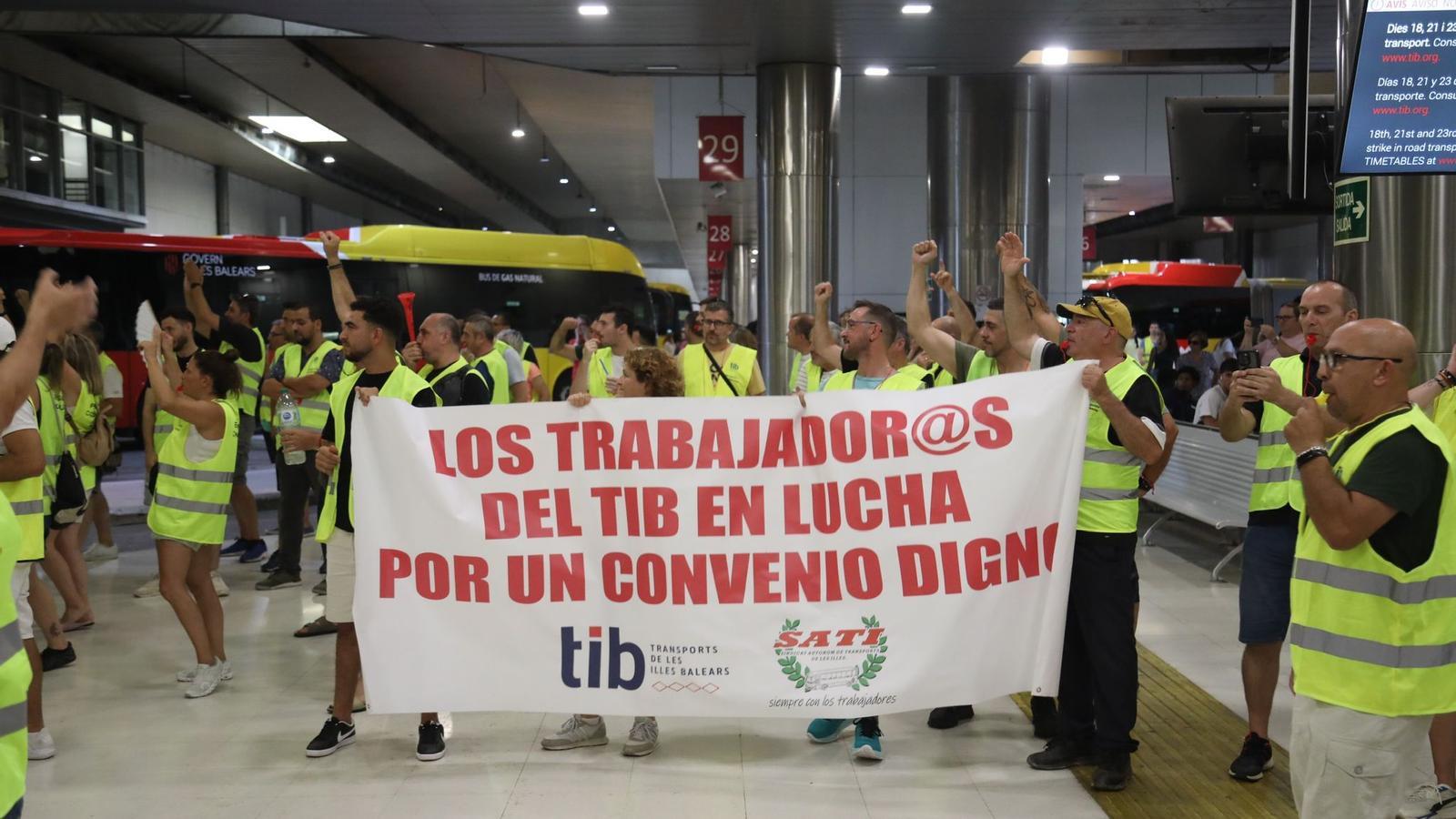Outsourcing: efficiency or evasion of responsibility?
The public administration pays companies that provide services, but they hire others and do not control the conditions of the workers.


PalmWorkers from different sectors have mobilized in recent months to demand fair working conditions. Those from the TIB (Spanish Institute of Industrial Property) called an indefinite strike, which ended on Friday, after reaching an agreement with the intercity transport concessionaires in Mallorca. Subcontracted ground service workers at Palma Airport threatened to "cause a total collapse" in August if their situation did not improve. Teachers at Palma's outsourced daycare centers also went on strike in April to demand equal pay with the rest of the municipally managed centers. These three examples share a common and significant feature: they involve bidding by public administrations to offer services through private companies.
The winning entity in the tender issued by the Administration is granted the right to operate a public service or good for a period of time in exchange for certain conditions and compensation. But these companies often subcontract others to handle part of the services. In this way, the Administration "ignores the problem," laments Tino Davia, Secretary of Occupational Health and Environment for UGT Servicios Públicos (the Public Services Union). What responsibilities do public institutions that pay private companies to manage a service have? And what about the concessionaire companies? And the subcontractors? What consequences does this have for workers? The chain of responsibility is blurred, but working conditions are still decided in the offices of the institutions.
Responsibilities
The Administration must hold a public tender to hire private companies if the budget exceeds €40,000 for public works and €15,000 for services, according to Toni Bennàssar, a lawyer specializing in public law.
Public institutions establish in the tender specifications the requirements that companies must meet to manage the service and select one. Companies "try to lower the price because economics is one of the essential points taken into account, although it is not the only one," explains lawyer José Manuel Raya. "If they can offer the same service for one million and not two, they submit a low-priced bid and usually win the tender by points," he adds. The problems arise later. "They see that they can't have 50 workers, as established in the tender specifications, and they have 45. If they can cut back anywhere, they cut back," Raya emphasizes. For example, in the case of the TIB, the workers protested because they are tired of "doing the work of two people."
When the public administration grants a service concession to a private company that does not subcontract to others, the institution is responsible for ensuring that the concessionaire complies with the conditions of the specifications. Failure to do so can result in sanctions. Bennàssar points out that concessionary companies always leave "a deposit that is used to cover any liabilities that have not been assumed." This money is returned "when the contract ends."
However, if the concessionary company subcontracts to another company, "the government cannot intervene in disputes between contractors and subcontractors," the expert clarifies. "If the concessionary company performs its services properly, it cannot say anything," he emphasizes. Both companies also regulate their relationship with a set of terms and conditions.
Bennàssar adds that the regulations governing the private sector provide for "very high fines for illegal subcontracting." Although the government cannot intervene, it can determine in the terms and conditions of any concession whether subcontracting is permitted or not. The expert believes that the terms and conditions, which "generally allow subcontracting," should be drawn up as carefully as possible.
In any case, Bennàssar regrets that the law allows subcontracting. "It should be prohibited and specified in the terms and conditions," he says. "Restrictive reforms have been attempted, but there is a philosophy originating in Europe to encourage subcontracting. This is seen as opening the market to small businesses. But what benefit is there really for them?" he asks. Along the same lines, he emphasizes that "the contracting company does nothing, just collects." Regarding the construction sector, it is "the only one in which subcontracting is regulated by law." Davia, for her part, criticizes the fact that "all control is given to the subcontracting company and that workers' conditions are not monitored."
Consequences for workers
Salary cuts, instability, and frequent changes of employer are some of the situations faced by workers in subcontracted or outsourced companies—they account for more than 20% of public sector employees, according to data from the UGT (General Union of Workers' Unions). The example of a worker at Menzies Aviation—a ground handling company operating at Palma Airport—is significant: she was paid €400 for 10 hours a week, while during the peak season she worked many more hours.
Concession and subcontracted workers earn between 20% and 40% less than civil servants, according to the UGT (General Union of Workers' Unions). "For the same job," Davia emphasizes. Why doesn't the government directly hire all this personnel it sends to concessionary or subcontracted companies?
The reform promoted by former Finance Minister Cristóbal Montoro in 2012 "does not allow administrations to increase their staff, unless it is under certain conditions," Bennàssar emphasizes. "This stifles public administrations, which pay a private company much more than they would a public company," the jurist adds.
Regarding schedules, workers at concessionary and subcontracted companies must work many hours of overtime due to the low price of the service. Some even sleep in their cars because the legally required rest period between shifts is not provided, as recently reported by Palma airport workers.
The organizational secretary of the CCOO Habitat Federation, Miguel Pardo, explains that, in the construction sector, contracting companies force subcontracted workers to "work more than their fair share," with the risk of causing accidents that this entails. On the other hand, he complains that workers have a "more difficult time" claiming their rights in this sector, since a construction company "can disappear tomorrow or change its name and go back to bankruptcy."
